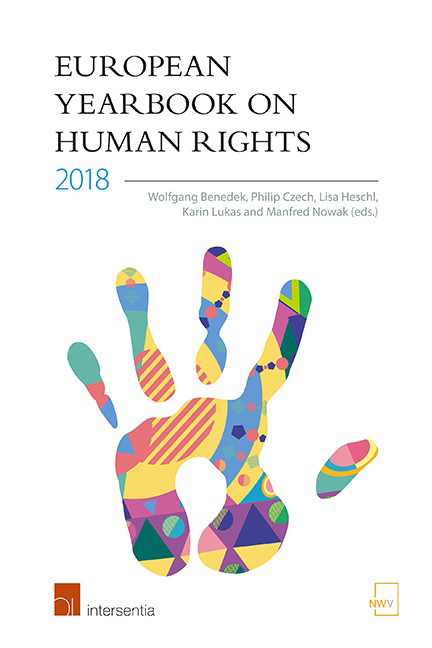Book contents
- Frontmatter
- Scientific Advisory Board
- Editors’ Preface
- Contents
- List of Abbreviations
- List of Contributors
- Part I Topic Of The Year
- Part II Eu
- Part III Coe
- PART IV OSCE
- Part V Others
- Part VI Book Reviews
- Katja S. Ziegler, Elizabeth Wicks and Loveday Hodson (eds.): The UK and European Human Rights – A Strained Relationship?
- Emily Reid: Balancing Human Rights, Environmental Protection and International Trade – Lessons from the EU Experience
- Nicole Bürli: Third-Party Interventions before the European Court of Human Rights
- Stijn Smet and Eva Brems (eds.): When Human Rights Clash at the European Court of Human Rights – Conflict or Harmony?
- Violeta Moreno-Lax: Accessing Asylum in Europe, Oxford Studies in European Law
- Mark Dawson: The Governance of EU Fundamental Rights
- Philip Leach: Taking a Case to the European Court of Human Rights, 4th Edition
- Sionaidh Douglas-Scott and Nicholas Hatzis (eds.): Research Handbook on EU Law and Human Rights
- Lauri Mälksoo and Wolfgang Benedek (eds.): Russia and the European Court of Human Rights – The Strasbourg Effect
- Index
Sionaidh Douglas-Scott and Nicholas Hatzis (eds.): Research Handbook on EU Law and Human Rights
from Part VI - Book Reviews
Published online by Cambridge University Press: 31 January 2019
- Frontmatter
- Scientific Advisory Board
- Editors’ Preface
- Contents
- List of Abbreviations
- List of Contributors
- Part I Topic Of The Year
- Part II Eu
- Part III Coe
- PART IV OSCE
- Part V Others
- Part VI Book Reviews
- Katja S. Ziegler, Elizabeth Wicks and Loveday Hodson (eds.): The UK and European Human Rights – A Strained Relationship?
- Emily Reid: Balancing Human Rights, Environmental Protection and International Trade – Lessons from the EU Experience
- Nicole Bürli: Third-Party Interventions before the European Court of Human Rights
- Stijn Smet and Eva Brems (eds.): When Human Rights Clash at the European Court of Human Rights – Conflict or Harmony?
- Violeta Moreno-Lax: Accessing Asylum in Europe, Oxford Studies in European Law
- Mark Dawson: The Governance of EU Fundamental Rights
- Philip Leach: Taking a Case to the European Court of Human Rights, 4th Edition
- Sionaidh Douglas-Scott and Nicholas Hatzis (eds.): Research Handbook on EU Law and Human Rights
- Lauri Mälksoo and Wolfgang Benedek (eds.): Russia and the European Court of Human Rights – The Strasbourg Effect
- Index
Summary
Human rights are pronounced as one of the European Union‘s (EU) founding principles in Article 2 Treaty on European Union (TEU) and the Charter of Fundamental Rights of the European Union (CFR, Charter) holds the same legal value as the Treaties of the EU, constituting primary EU law (Article 6 TEU). Scholars have exhaustively discussed the role of fundamental rights within the Union for decades. This research handbook provides a compilation of the latest research, ideas, practices and critical insights regarding the position of human rights within the EU. It is made up of 23 articles by distinguished professionals in the field and aims at contributing to current debates on this issue. It is available in hardcover and as an e-book.
The handbook starts with an introduction by the editors and is then divided into three parts. The first part, which is titled ‘The Framework’, addresses the evolution of the human rights protection system within the EU. Stijn Smismans opens by critically analysing the emergence of four fundamental rights narratives, which retrospectively claim that the main purpose of the European Union/European Economic Community was to ensure peace and unification in Europe. These narratives imply that human rights were foundational for the Union and thus act as its raison d'etre, even though the original treaties did not mention human rights and the Court of Justice of the European Union (CJEU) was indifferent towards them initially. Civil society and political institutions believed and acted upon these political myths nonetheless and they even shaped how the EU came to see itself. The author discusses current policies, which put these narratives to the test.
Several essays proceed to assess the scope of application and contribution of the Charter and question whether it could widen the competences of the EU. Angela Ward evaluates the judicial enforceability of EU fundamental rights. Other authors examine particular freedoms, such as the right to good administration in Art 41 CFR or the freedom of movement for EU citizens, in more detail. Alison Young aims to provide a theory of human rights adjudication for the CJEU.
- Type
- Chapter
- Information
- European Yearbook on Human Rights 2018 , pp. 619 - 620Publisher: IntersentiaPrint publication year: 2018



